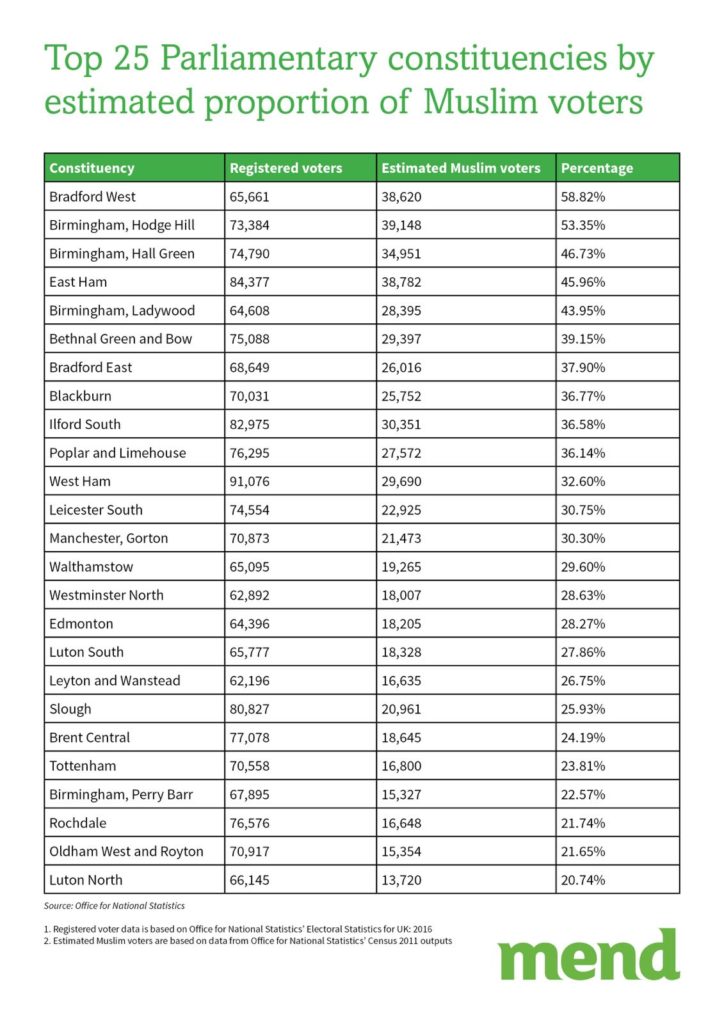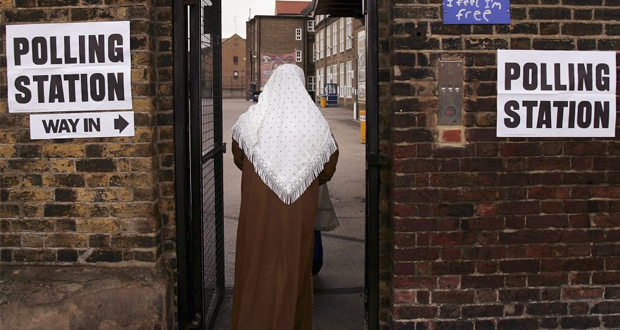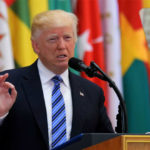Scroll down for Muslim vote stats, how to register (deadline tonight at 11:59pm) and to watch our Islam21c BIG Discussion on the General Election 2017
With the deadline to register to vote hours away, we look again at the results of the last general election and the remarkable influence a unified strategy on part the Muslim community can achieve.
Sourced from the Office of National Statistics, MEND has collated a list of some of the UK Constituency marginal seats with a large Muslim electorate. These constitute ‘Defence Seats’ or the seats the respective party in that constituency will look at fighting hard to maintain. In the South Welsh coastal town of Gower, one would not expect to find a large Muslim community. However, this happens to be the Tories’ most marginal seat, having secured it with a 27 vote majority over Labour. The small Muslim electorate holds a potential 259 votes with an easy swing in favour of Labour.
It is a similar story in Derby North with a Conservative majority of 41 and 2,248 potential Muslim voters. Around 4,700 Muslim voters can register in Croydon Central and Bury against a few hundred-vote majority for the Tories in each. The list reveals 11 such constituencies though it is not exhaustive. In fact, the Henry-Jackson Society, more attempting to scaremonger than to encourage Muslim youth from political engagement reported that Muslims could potential decide 25% of seats in the run-up to the 2015 elections.[1] Although the HJS is not exactly known for intelligence or analysis, the unified impact of Muslims should not be underplayed, and with Conservative politicians pleading for the votes of smaller minorities,[2] one can only suppose a unified Muslim strategy will influence legislators out to win their vote.
Muslims have traditionally underplayed their potential influence on the UK Elections. But with many of the incumbent Tory Government’s policies ostracising Muslim communities, failing to address the rise in Islamophobia, targeting welfare and the vulnerable and failing to enforce fairness when it comes to taxing the richest and largest corporations, with the poorest suffering as a result, Muslims are looking to redraw and unite their strategy in bringing about positive change that benefits everyone, not just a select few.
The debate around voting from the perspective of Islamic Jurisprudence (Fiqh) has gone on for decades amongst the masses, but has been a relatively relaxed topic amongst scholarly circles since legal experts recognise that the ruling on voting in a particular election would depend on the context and place. Leading scholars and activists have argued that the very existence of an individual within a liberal democracy means their vote or abstention inevitably affects the result, with an abstention equivalent to a vote for the party that comes out on top.
Scholars and activists that have urged participation have used a number of reasons, from the essence of voting being permissible in the first place, to the Islamic obligation to minimise harm, and be involved in wider society. Shaikh Dr Haitham al-Haddad recently argued in an Islam21c BIG Discussion that voting on a similar premise potentially reaches the level of being an Islamic obligation,[3] and as such becomes an action worthy of reward if done with the intention to cause change within the scope of every eligible Muslim citizen in the UK.
Whether or not voting is permissible in theory is not therefore the question many Muslims should be focusing on, but instead we should be concerned with how to make the greatest positive impact. In order to inform such discussions, MEND has done a great service by collecting the following information, which we should all be keen to study and share with our friends and families.




The deadline for registering to vote will be midnight on the 22nd of May and the General Election will take place on the 8th of June. This can be done online through the following link:
https://www.gov.uk/register-to-vote
[donationbanner]
Source: www.islam21c.com
Notes:
[1] http://henryjacksonsociety.org/2015/04/30/muslim-vote-could-decide-25-of-seats-victory-in-a-quarter-of-british-constituencies-will-be-decided-by-islamic-voters/
[2] http://www.telegraph.co.uk/news/2017/05/17/boris-johnson-reprimanded-talking-alcohol-sikh-temple/
[3] www.islam21c.com/generalelection










Apart from a small fraction of the overall Muslim electorate who live in marginal constituencies the vast majority of Muslims have no impact or influence on which party becomes the government because they live in safe Labour constituencies. It was only when Respect was a serious challenger to Labour in places like Bethnal Green, Birmingham, and Bradford was there an impetus to consider voting there.
Bristol West has a sizeable Muslim electorate and it’s a rare Labour or Green Party marginal and one that the Green Party can win in addition to Brighton Pavilion. Will the Muslims be voting for the Green Party or will they be voting Labour in Bristol West?
Conversation has unfortunately revealed that Muslims by and large do not know how the election system works. Some believe that you vote for a party leader whilst others believe that votes for parties are piled up nationally and the party with the most votes wins. Neither of these are true. Britain is divided into constituencies. Your vote only counts within that constituency. You vote for a candidate not a party. The candidate which wins the most votes (but often less than 50%) wins that constituency. The party with the most elected candidates wins the general election.
And what if non Muslims use their vote to vote for candidates who are against Muslims? Than what?
Don’t you think we should be thinking what’s best for our country when we vote rather than what’s best for Islam?
I agree Trevor that PR would give all sorts of opinions a voice in Parliament. So what? Every vote should count, given a minimum threshold. Your question poses exactly the right scenario, where different religions polarise into opposing groups. This is exactly what’s happening in Iraq, Syria, Yemen etc. etc.
Western advanced democracies like Switzerland (in my opinion one of the most democratic countries in the world) have had PR for years, and yes, parties like the BNP, which may get , say, 5% of the vote and thus some MPs, have just as much right as other small parties to have representatives in Parliament. Ukip got 4 million votes and one MP. The Scots. Nats. one and a half million and 57 MPs. This is grossly undemocratic. Also so what if non-Muslims use their vote for anti-Muslim candidates? This is perfectly legal, even if you don’t agree with it. Muslims can do the same, using their votes to elect pro-Muslim MPs. That’s democracy.
The point is that our crooked system ensures that we have Labour-Tory-Labour-Tory FOREVER, just as for the last 100 years. This is the disease at the heart of the British electoral system. “What’s the point of voting? Nothing will change.” Maybe you’re Labour and like it?
“The point is that our crooked system ensures that we have Labour-Tory-Labour-Tory FOREVER, just as for the last 100 years. ”
Well, no, we don’t.
One hundred years ago we had a coalition government with the <iberals as the largest party.
Error; 57 MPs, not votes. Sorry.
I don’t know the percentage of Muslim voters in the electorate, or the percentage of Muslim MPs in Parliament. I don’t like voting on religious lines, but in our democracy all voters have a right to vote for whom they please.
However there is a glaring hole in the electoral system here, which I believe lies at the heart of the sense of disillusionment of many voters: “whatever I vote for, it makes no difference” .
The gaping hole, which if fixed, would help Muslims to have more say over their needs, as well as allowing all votes to actually count, to be physically counted and used, is electoral reform, namely proportionate representation PR: legally binding local and national referendums; a written constitution, in order to bring crooked politicians to account; one person, one vote, with say a 5% threshold for a party to get MPs; constituency boundaries re-alignment for similar numbers of voters in each one. All these changes and subsequent election results would be subject to the laws laid down by Parliament, and would enable previously disenfranchised voters to get MPs to fight for their policies.
THE PRESENT SYSTEM IS BLATANTLY UNFAIR, LABOUR TORY LABOUR TORY FOREVER, ALLOWING FOR EXAMPLE ONE AND A HALF MILLION SCOTS. NATS. TO HAVE 57 VOTES, WHILE NEARLY FOUR MILLION UKIP VOTERS GOT ONLY ONE, AS DID ONE MILLION GREENS. HOW MANY MPS COULD AN ISLAMIC PARTY GET WITH PR?
I support replacing the dysfunctional FPTP with PR but there isn’t strong support for PR from the Muslim community. I’m not sure if it’s a result of a poor understanding of the election system amongst Muslims or a fear that PR could result in MPs from the BNP. Some Muslims argue that we must keep FPTP no matter how unfair or dysfunctional it is simply in order to help keep extremists out of Parliament.
FPTP will not work against an Islamic party as much as it will work against the Green Party or UKIP. This is because FPTP rewards parties that have strong support concentrated into particular constituencies and punishes parties where support is more thinly or evenly spread. The Muslim population in Britain is heavily concentrated into a small number of towns and cities. This explains why the Respect Party (which is not an Islamic party) managed to elect MPs before the Green Party and UKIP did despite these parties being around longer and having much more support on a national basis. The Respect voters were concentrated into a few constituencies but there were vast swathes of the country where Respect had virtually no support whereas the Green and UKIP voters were more thinly spread out across the country and they didn’t have the luxury of a concentrated support base until they won Brighton Pavilion and Clacton respectively. Therefore an Islamic party could contest just 10 constituencies and elect 5 MPs on just 1% of the national vote.